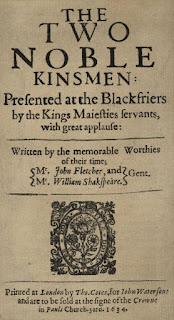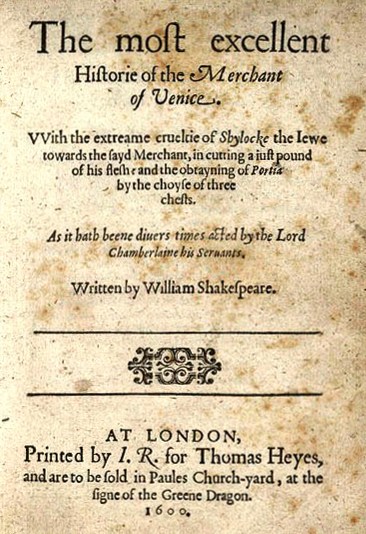Venus and Adonis (1592-1593) - “Love comforeth like sunshine after rain, But Lust's effect is tempest after sun…”
Venus and Adonis (1592-1593) - “Love comforeth like sunshine after rain, But Lust's effect is tempest after sun…”
The plague hit London very badly late in 1592 and into 1593. The watchmen and death cart carriers had started to move through the streets around Bishopsgate where Shakespeare had recently moved. The bodies did not seem to even stop through the Winter and Spring and by May, with the temperatures increasing, the death cart’s appearance seemed to be a daily occurrence.
Shakespeare had spent a considerable amount of money (probably about £11) at the end of 1592 acquiring a one twelfth share in the Lord Strange’s Men (later to be known as the Lord Chamberlain’s Men) and he had expected this would pay dividends in 1593. Shakespeare must have heaved a sigh of relief when the theatres re-opened on January 1st 1593 and he probably went back to playwrighting in earnest. But by January 21st, the deaths had started to build up again and the theatres were closed again. As the deaths started to mount up and almost 10 percent of London had died, Shakespeare knew no plays would be performed that season. He may have done some provincial touring as an actor with the company during some months in 1593 or he may have started on ‘Edward III’ and the comedy ‘Love’s Labour Lost’ with the hope of the playhouses or with the hope of the inn yards opening up again in early 1593 as performance venues. But with the playhouses indefinitely shut and controls tightening on any activities in London’s inns due to the plague, Shakespeare had to find another avenue for revenue and another outlet for his writing. He needed to do this quickly since his one twelfth share in the Lord Strange’s men would not be paying dividends in 1593.
After talking to player friends and perhaps even having a chin wag with Christopher Marlowe, Shakespeare started to toy with the idea of writing poetry and dedicating it to a sponsor. He had probably started on his own poetic version of ‘Venus and Adonis’ late in 1592 based on the story and passages from Ovid’s ‘Metamorphoses’ as translated by Arthur Golding in 1567. He had heard that the family of Henry Wriothesley (The Third Earl of Southampton) were keen for him to get married. Although he wasn’t a very rich patron, Southampton would probably accept (and pay for) being a “muse” for Shakespeare’s poetic offerings. Besides, the 1580’s trend of poets and the aristocracy reading and recreating Ovidian and erotic poetry had continued into the 1590’s. The form was full of lustful metaphors, aphorisms and parisons, ripe to flatter the young Southampton and elicit his excitement and his patronage.
When Henry Wriothesley (the third Earl of Southampton) saw his father (Henry Wriothesley, the second Earl of Southampton) die in 1581 when he was only eight years old, William Cecil (Lord Burghley and one of Queen Elizabeth's ministers, became his legal guardian until Southampton turned 21 years old. William Cecil wanted Southampton to marry well and when Southampton turned 17 in 1590, Cecil made a contract for Southampton to marry Lady Elizabeth. Southampton knew that the marriage contract would be binding but like Adonis, he wanted to remain unattached and single. By 1593 things were getting a little desperate for Southampton because he knew that if he didn't fulfill the contract by his 21st birthday, Cecil could impose fines and cripple Southampton's estates. In 1593, Southampton had 1 year left to fulfill the contract. So although Shakespeare's 'Venus and Adonis' is dedicated to Southampton, Shakespeare (an excellent but obscure writer at the time) is likely to have received some payment from William Cecil for the poem to encourage Southampton to marry Lady Elizabeth and then got paid something from Southampton on delivery of the poems. Southampton may have never known that Cecil had paid Shakespeare.
It is possible that the first poems that Shakespeare wrote to and for Southampton were his Sonnets 1-17 which are sometimes known as the Procreation sonnets. They centre around the theme and purpose of praising a young man's beauty and encouraging him to marry and procreate. When they appear with all the other sonnets years later, they are dedicated to Southampton but Shakespeare may have written and sent off Sonnets 1-17 in 1592. Venus and Adonis was registered with the Stationer's Company, without attribution. on April 18, 1593. This long poem (over 1000 lines) would have taken over 100 hours to write. It is a narrative poem which revolves around the tale of a young man who is desired by Venus, the goddess of Love). But the young Adonis spurns her advances preferring the bachelor's life. The story ends in tragedy with Adonis killed by a boar, leaving Venus to lament her loss.
So Shakespeare obviously avoided the Plague, poverty and starvation in 1592-1593. It is alleged that he was paid £100 (£50,000 in today's money) by Southampton (though for £50 (£25,000 in today's money) is another figure sometimes estimated) Venus and Adonis. Some other sources suggest higher. Some other sources suggest that Shakespeare was also paid by Lord Burghley for the poem to be written and given to Southampton. Lord Burghley may have paid Shakespeare £100-150 for his services and the poem.
Ultimately, while the poem Venus and Adonis may have been successful and widely read, it purpose as an encouragement for Southampton to marry the young Lady Elizabeth was not. When Southampton reached the age of 21 on October 6th 1594, he still refused to marry and he was fined £5000. Southampton was forced to take out a loan to pay the fine and was burdened with the interest on that loan.
With the money he had received, Shakespeare was able to send money to his wife Anne Hathaway back in Stratford upon Avon. She probably invested wisely in more grain storage and grain. Anne Hathaway was a beer brewer too so this money may have gone towards setting up this business properly. Shakespeare was able to stay in London and get down to writing more plays in anticipation of the Plague abating and the playhouses opening again.
“Love comforeth like sunshine after rain,
But Lust's effect is tempest after sun.
Love's gentle spring doth always fresh remain;
Lust's winter comes ere summer half be done.
Love surfeits not, Lust like a glutton dies;
Love is all truth, Lust full of forged lies.”
But Lust's effect is tempest after sun.
Love's gentle spring doth always fresh remain;
Lust's winter comes ere summer half be done.
Love surfeits not, Lust like a glutton dies;
Love is all truth, Lust full of forged lies.”
Shakespeare knew that writing poetry and dedicating it to a sponsor could be quite lucrative. He had probably started on his own poetic version of ‘Venus and Adonis’ late in 1592 based on the story and passages from Ovid’s ‘Metamorphoses’ as translated by Arthur Golding in 1567. He had heard that the family of Henry Wriothesley (Earl of Southampton) were keen for him to get married. Although he wasn’t a very rich patron, Southampton would probably accept (and pay for) being a “muse” for Shakespeare’s poetic offerings. Besides, the 1580’s trend of poets and the aristocracy reading and recreating Ovidian and erotic poetry had continued into the 1590’s. The form was full of lustful metaphors, aphorisms and parisons, ripe to flatter the young Southampton and elicit his excitement and his patronage.
The poem is long and difficult to follow at times. It is best read out aloud and there are some good audiobook readings. I went for the reading out aloud which takes about two hours with short breaks. So hear goes.
The poem opens with Adonis making fun of love and lovers. Venus arrives on the scene and she falls in love or lust with Adonis. She plucks him off his horse and pushes him to the ground and seduces him. Adonis is taken back by her forthright behaviour. Venus asks only for a simple kiss but when she approaches Adonis, he turns away. Venus, can see that Adonis is young but she will not accept his rejection and emphasises her beauty and the fact that many men have desired and wooed her including the God of War himself. It is midday and Venus is getting hot but Adonis thinks the only heat is the sun itself. She bursts into tears.
Venus’ offers continue:
Stray lower where the pleasant fountains lie…
Just then Adonis tries to remount his horse but alas, his horse has found a mate. Venus persists. Her desire is boundless and she says that he should follow the example of his own horse. Adonis recalls that he has heard that love is a life in death but reinforces the only death he will embrace is killing boar.
Venus describes how she would love him even if she was bereft of her five senses. This doesn’t work so she pretends that she is dead and Adonis tries to revive her through kissing her. She opens her eyes and gives in to her lust but her desires cannot be met. Adonis seems to give into her, "Her lips are conquerors, his lips obey..." He once more becomes unresponsive and talks of when he will go boar hunting in the morning.
“ She’s Love, she loves, and yet she is not lov’d.”
Prophesizing Adonis’ death in a hunt, Venus sees that the night and darkness means she must retreat. Adonis declares it is not love her hates but lust. He runs away and Venus holds her heart and howls.
As the sun rises on a new day, Venus hears the hounds of the hunt cornering an animal. She thinks that Adonis is dead and she has an imaginary conversation with Death and asks Death to forgive her for wishing Adonis dead. She sees the young Adonis dead and bloodied and she sheds tears until she has no more to shed. She curses the boar that killed him and them contemplates that perhaps the boar, like her was only trying to kiss him.
Venus laments, “… all love’s pleasure shall not match his woe…” as the body of Adonis melts into the earth and a purple flower splattered in white appears, she cries out:
There shall not be one minute in an hour




Comments
Post a Comment